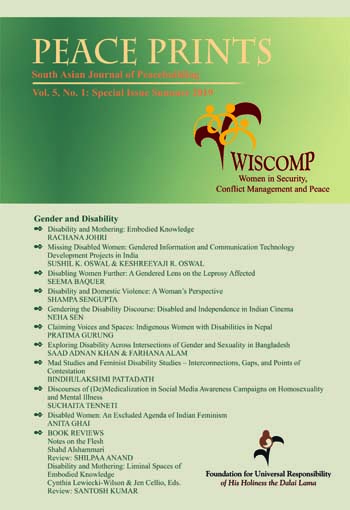
| » |
Foreword
Meenakshi Gopinath Read More... |
| » |
Editorial
Anita Ghai Read More... |
| » |
A Writer's Block
Vinayana Khurana Read More... |
| » |
Missing Disabled Women: Gendered Information and Communication Technology Development Projects in India
Sushil K. Oswal and Keshreeyaji R. Oswal Read More... |
| » |
Disability and Mothering: Embodied Knowledge
Rachana Johri Read More... |
| » |
Disabling Women Further: A Gendered Lens on the Leprosy Affected
Seema Baquer Read More... |
| » |
Disability and Domestic Violence: A Woman's Perspective
Shampa Sengupta Read More... |
| » |
Gendering the Disability Discourse: Disabled and Independence in Indian Cinema
Neha Sen Read More... |
| » |
Claiming Voices and Spaces: Indigenous Women with Disabilities in Nepal
Pratima Gurung Read More... |
| » |
Exploring Disability Across Intersections of Gender and Sexuality in Bangladesh
Saad Adnan Khan and Farhana Alam Read More... |
| » |
Mad Studies and Feminist Disability Studies - Interconnections, Gaps, and Points of Contestation
Bindhulakshmi Pattadath Read More... |
| » |
Discourses of (De)Medicalization in Social Media Awareness Campaigns on Homosexuality and Mental Illness
Suchaita Tenneti Read More... |
| » |
Disabled Women: An Excluded Agenda of Indian Feminism
Anita Ghai Read More... |
| » |
To Be Corrected
Vinayana Khurana Read More... |
| » |
Book Review Notes on the Flesh Reviewed by: Shilpaa Anand Read More... |
| » |
Book Review Disability and Mothering: Liminal Spaces of Embodied Knowledge Reviewed by: Santosh Kumar Read More... |
Anita Ghai is Professor in School of Human Studies, Ambedkar University
Contact:
anitaghai@aud.ac.in
Contact Us
Archives
 |
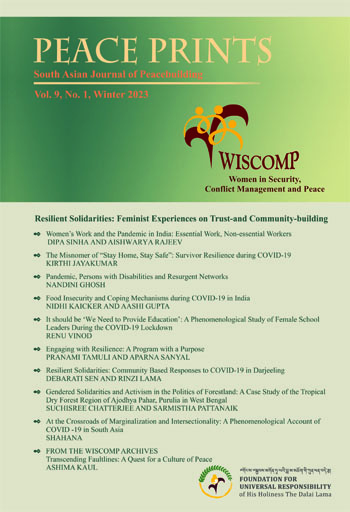 |
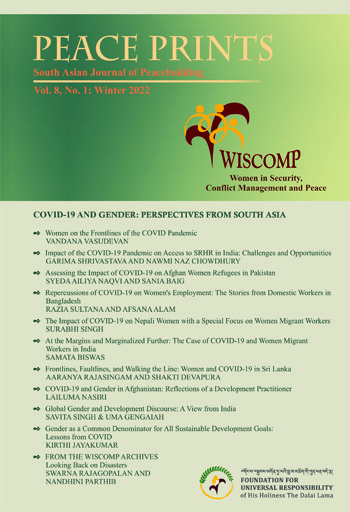
|
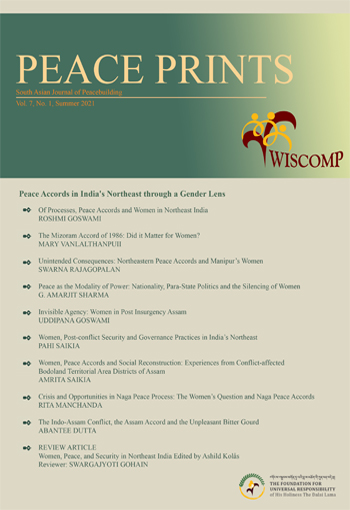
|
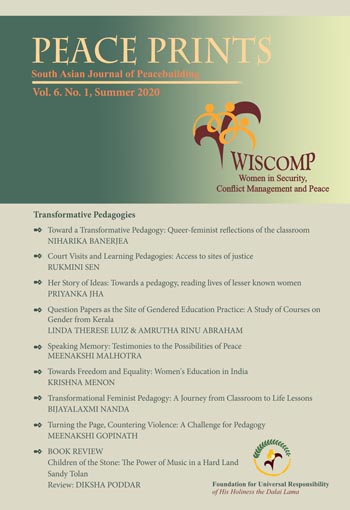 |
|
Being "(Re) Armed": Women and the Security Sector
Volume 10, No. 1, 2024 |
Resilient Solidarities: Feminist Experiences on Trust-and Community-building Volume 9, No. 1, 2023 |
COVID-19 and Gender: Perspectives From South Asia Volume 8, No. 1, 2022 |
Peace Accords in India's Northeast through a Gender Lens Volume 7, No. 1, 2021 |
Transformative Pedagogies Volume 6, No. 1, 2020 |
 |
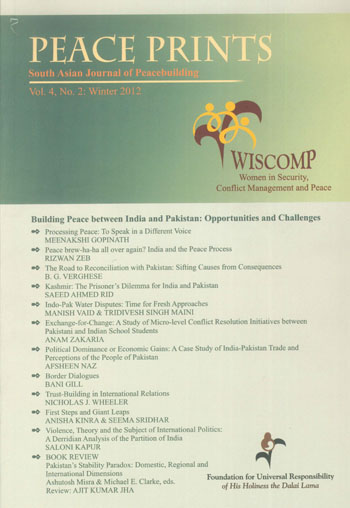 |
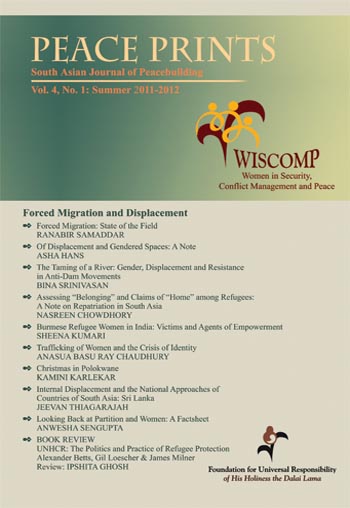 |
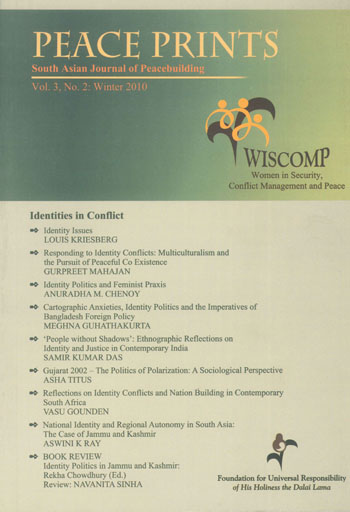 |
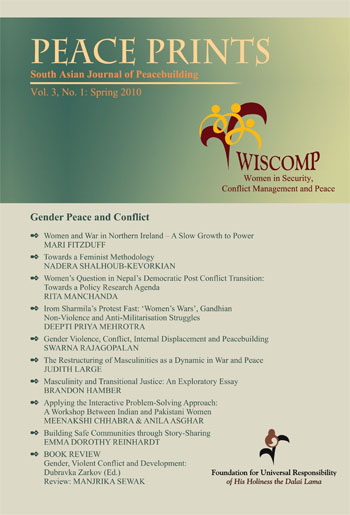 |
|
Gender and Disability
Vol. 5, No. 1, 2019 |
Building Peace between India and Pakistan
Vol 4, No 2, 2012 |
Force Migration and Displacement Vol 4, No 1, 2011-12 |
Identities in Conflict
Vol 3, No 2, 2010 Special Edition |
Gender Peace and Conflict
Vol 3, No 1, 2010 |
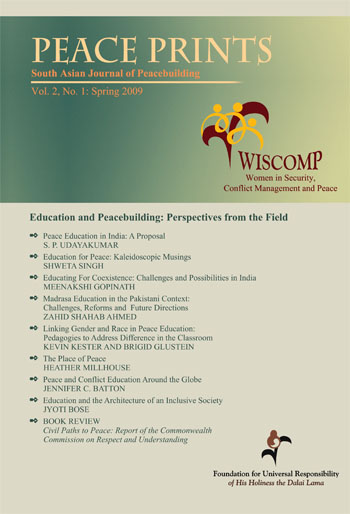 |
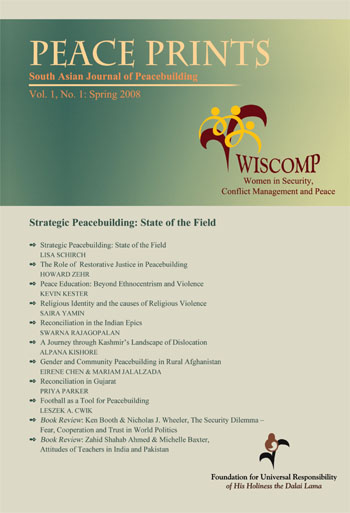 |
|||
| Education and Peacebuilding Vol 2, No 1, 2009 |
Strategic Peacebuilding: State of the Field
Vol 1, No 1, 2008 |
Returning with a Renewed Mission!
Peace Prints is back after a hiatus of six years with a renewed mission to enhance its footprint not just in South Asia but beyond. In keeping with the expansion in the domain of Peacebuilding, Peace Prints has expanded its scope to include the emerging frontiers of scholarship and research. The organizational and funding constraints have been overcome. In this new phase of reorganization, we infuse this pioneering effort with the energy that comes with expanding circles of engagement and linkages to wider networks of both experienced and younger researchers.About WISCOMP
WISCOMP, an initiative of the Foundation for Universal Responsibility has been a pioneer in initiating the discourse on women, peace, and security in South Asia. It was at the forefront of engaging with these issues, well before they found articulation in the UN Security Council Resolution 1325 in October 2000. Its efforts have yielded a robust network across borders and boundaries that highlight the leadership of women in the areas of peace and security—a space that was hitherto not fully encouraging of the participation of women.WISCOMP is an initiative of the Foundation for Universal Responsibility, which was established with funds from the Nobel Peace Prize awarded to His Holiness The Dalai Lama in 1989.
For more information, visit www.wiscomp.org

